| Agile Engineering Data Management AutoVue Integration Installation and Administration Guide Release e6.2.1.0 E69176-03 |
|
 Previous |
| Agile Engineering Data Management AutoVue Integration Installation and Administration Guide Release e6.2.1.0 E69176-03 |
|
 Previous |
This section describes the manual installation of the Offline Metafile Cache Service.
|
Note: Further information about Metafile Cache Service can be found in the latest AutoVue Client/Server Deployment Installation and Configuration Guide on OTNhttp://www.oracle.com/technology/documentation/autovue.html |
Batch Client has to run as service
JVue bean as control interface of the AutoVue server
VueLink DMS as data source and used to check-in the metafile
AutoVue batch engine implemented in Java (JVue bean control)
Timezone settings for remote AutoVue locations
|
Note: On remote locations with a different timezone than the central location, the tomcat must be configured with the timezone setting of the central location. That is necessary for AutoVue in order for the Metafile Caching to work correctly.The timezone is set in the Apache Tomcat Properties mask. In the Java Options set Duser.timezone to the timezone of your central location (e.g. -Duser.timezone=Europe/Amsterdam. |
|
Note: The Offline Metafile Cache Service uses a 64 bit JVM. |
|
Note: DFM replication is not supported; all files have to be replicated with the standard replication feature before the file can be cached on remote locations. The system checks if all files are replicated and sets an error code if not all files are available on the remote location. |
The installation package of the Offline Metafile Cache Service "AutoVue.zip" is located in the package directory of the Agilee6 installer medium. The "AutoVue.zip" contains the AutoVueBatch.zip which is located in the subdirectory axalant\bin\java.
|
Note: The JAR files are provided within in the ZIP package. |
Extract the package to your installation directory.
In this installation example, the installation path is (the AutoVueBatch path is the base path in the package):
| Windows | Oracle Linux |
|---|---|
| C:\Program Files\Agile_e6\AutoVueBatch | /home/plm/Agile_e6/AutoVueBatch |
Unzip.
| Windows | Oracle Linux |
|---|---|
| unzip -j ..\package\autovue.zip axalant\bin\java\AutoVueBatch.zip -d C:\tempunzip C:\temp\AutoVueBatch.zip -d "c:\Program Files\Agile_e6" | unzip -j ../package/AutoVue.zip axalant/bin/java/AutoVueBatch.zip -d /tmpunzip /tmp/AutoVueBatch.zip -d /home/plm/Agile_e6 |
The installation package contains the following directories:
AutoVue Service Root (C:\Program Files\Agile_e6\AutoVueBatch)
axalant
-bin
- intel-ms-nt6.1 (Windows FMS Client binaries)
- i686-linux-ol7 (Oracle Linux FMS Client binaries)
- java (Java archives)
- cmd (Windows scripts)
- ini (Configuration files)
- batch (Batch service files)
- scripts (Oracle Linux scripts)
ext
- bin
- intel-ms-nt6.1
- x64-ms-nt6.1
- x86_64-linux-ol7
- java
tmp (Logging directory)
You need to adapt the start-up script to setup the 64-bit Java Runtime (JRE) and the installation path of the Offline Metafile Cache Service.
| Windows | Oracle Linux |
|---|---|
| The scripts are located in the axalant/cmd sub directory of the installation. The vuelink_batch.bat script contains the following basic configuration settings: set JAVA_HOME=<java_64bit_home>set ep_root=<ROOT DIRECTORY OF THE OFFLINE METAFILE CACHE SERVICE>Example: set JAVA_HOME=C:\Program Files\Java\jre1.8.0_<update_number>set ep_root=C:\Program Files\Agile_e6\AutoVueBatch | The scripts are located in the axalant/scripts sub directory of the installation. The vuelink_batch script contains the following basic configuration settings: JAVA_HOME=<java_64bit_home>export JAVA_HOMEExample:
JAVA_HOME=/usr/local/java/jre1.8.0_<update_number> |
The vuelink.properties file is located at the axalant/batch sub directory of the installation.
These files set the environment variables needed by the Offline Metafile Cache Service.
|
Note: The Offline Metafile Cache Service needs both parameters. |
EP_DDM_SITE=<DFM SITE>
Checks in the metafile that was downloaded from the AutoVue server.
EP_PVM_SITE=<PVM SITE>
Defines the AutoVue server.
The following properties must be adapted. The other properties should not be changed:
# # ECI connection # # Hostname of the Agile e6 server # host=<PLM host> # # Port number of the Java Daemon # port=<PLM port> # # Application name connect to # env=<PLM env> # # Default encoding for the ECI connection # encoding=UTF-8 # # Scope for the Java Daemon # # This should always be BATCH for batch applications # scope=BATCH # # Client modes to define widget behaviours on client side. Valid values are: BATCH, TEST # # BATCH: no widgets will be opened on client side. # TEST: widgets will be opened on client side virtually. # mode=BATCH # # PLM-API URL # #url=<axis-service-url> # # Directories # varenv.ep_root=<INST_ROOT> varenv.axalant_root=<INST_ROOT>/axalant varenv.$TMP=<INST_ROOT>/tmp # # Platform # varenv.EP_MACH=<EP_MACH> # # environment # varenv.EP_DDM_SITE=<DFM-site> varenv.EP_PVM_SITE=<PVM-site> # # HTTP FMS mode which defines if the HTTP FMS Client should be used or the native FMS Client. Default value: false # varenv.HTTP_FMS_MODE=false # # Security settings # Security.KeyStoreFile=file://<INST_ROOT>/init/wallet/private/batch/cwallet.sso Security.KeyAlias=orakey # # PLM Client # client1=<PLM_USER_with_manager_privilege>,<encryptedPASSWORD>,com.agile.autovue.VueLinkBatch
|
Note: The password has to be encrypted with the batchkeytool. For further information please refer to the Agile EDM Security Guide for Agile e6.2.1.0. |
| Windows Example (Extract from vuelink.properties) | Oracle Linux Example (Extract from vuelink.properties) |
|---|---|
# # ECI connection # # Hostname of the Agile e6 server # host=khe-plm # # Port number of the Java Daemon # port=20001 # # Application name connect to # env=plm_ref # # Default encoding for the ECI connection # encoding=UTF-8 # # Scope for the Java Daemon # # This should be always BATCH for batch applications # scope=BATCH # # Client modes to define widget behaviours on client side. # the valid values are: BATCH, TEST # # BATCH: no widgets will be opened on client side. # TEST: widgets will be opened on client side virtually. # mode=BATCH # # PLM-API URL # #url=<axis-service-url> # # Directories # varenv.ep_root=C:/Program Files/Agile_e6/AutoVueBatch varenv.axalant_root=C:/Program Files/Agile_e6/AutoVueBatch/axalant varenv.$TMP=C:/Program Files/Agile_e6/AutoVueBatch/tmp |
## ECI connection## Hostname of the Agile e6 server#host=khe-plm## Port number of the Java Daemon#port=20001## Application name connect to#env=plm_ref## Default encoding for the ECI connection#encoding=UTF-8## Scope for the Java Daemon## This should be always BATCH for batch applications#scope=BATCH## Client modes to define widget behaviours on client side.# the valid values are: BATCH, TEST# # BATCH: no widgets will be opened on client side.# TEST: widgets will be opened on client side virtually.#mode=BATCH## PLM-API URL##url=<axis-service-url>## Directories#varenv.ep_root=root=/home/plm/Agile_e6/AutoVueBatchvarenv.axalant_root=/home/plm/Agile_e6/AutoVueBatch/axalantvarenv.$TMP=/home/plm/Agile_e6/AutoVueBatch/tmp |
| Windows Example (Extract from vuelink.properties) | Oracle Linux Example (Extract from vuelink.properties) |
|---|---|
#
# Platform
#
varenv.EP_MACH=intel-ms-nt6.1
#
# environment
#
varenv.EP_DDM_SITE=ep
varenv.EP_PVM_SITE=ep
#
# HTTP FMS mode which defines if the HTTP FMS Client
# should be used or the native FMS Client.
# Default value: false
#
varenv.HTTP_FMS_MODE=false
#
# Security settings
#
Security.KeyStoreFile=file://C:/Program Files/Agile_e6/AutoVueBatch/init/wallet/private/batch/cwallet.sso
Security.KeyAlias=orakey
#
# PLM Client
#
client1=USER_NAME_MGR,{PLM-AES-128}RSA-PUBLIC-BASE64:L8zdgjaiHx...=,com.agile.autovue.VueLinkBatch
|
# Platform
#
varenv.EP_MACH=i686-linux-ol7
#
# environment
#
varenv.EP_DDM_SITE=ep
varenv.EP_PVM_SITE=ep
#
# HTTP FMS mode which defines if the HTTP FMS Client
# should be used or the native FMS Client.
# Default value: false
#
varenv.HTTP_FMS_MODE=false
#
# Security settings
#
Security.KeyStoreFile=file:///home/plm/Agile_e6/AutoVueBatch/init/wallet/private/batch/cwallet.sso
Security.KeyAlias=orakey
#
# PLM Client
#
client1=USER_NAME_MGR,{PLM-AES-128}RSA-PUBLIC-BASE64:L8zdgjaiHx...=,com.agile.autovue.VueLinkBatch
|
The Offline Metafile Cache service uses the same mechanism as the Java Daemon to install, remove, start, and stop the service.
The configuration of the Windows service registration can be found in the vuelink_wrapper.conf file which is located in the axalant/batch sub-directory of the installation.
#******************************************************************** # Wrapper NT Service Properties #******************************************************************** # WARNING - Do not modify any of these properties when an application # using this configuration file has been installed as a service. # Please uninstall the service before modifying this section. The # service can then be reinstalled. # Name of the service wrapper.ntservice.displayname=AgilePLM_AutoVue_Batch_Service # Display name of the service wrapper.ntservice.displayname=AgilePLM_AutoVue_Batch_Service # Description of the service wrapper.ntservice.description=Offline Metafile Cache for Agile PLM # Service dependencies. Add dependencies as needed starting from wrapper.ntservice.dependency.1= # Mode in which the service is installed. AUTO_START or DEMAND_START wrapper.ntservice.starttype=AUTO_START # Allow the service to interact with the desktop. wrapper.ntservice.interactive=false wrapper.ntservice.account=.\axalantrt wrapper.ntservice.password=********
To install the Offline Metafile Cache service as a Windows service use the vuelink_batch.bat command script located in the axalant\cmd sub directory of the installation.
vuelink_batch.bat -i
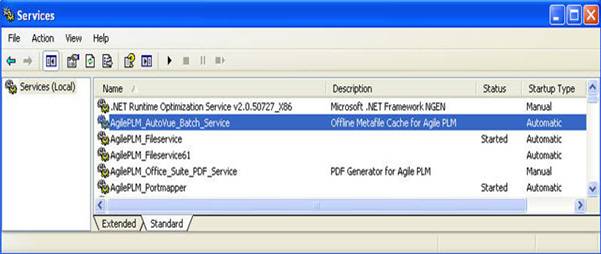
To run the Offline Metafile Cache service as console application use:
| Windows | Oracle Linux |
|---|---|
The vuelink_batch.bat command script located in the axalant\cmd sub directory of the installation.
vuelink_batch.bat -c Parameters list for vuelink_batch.bat: -c / -t / -p /-i /-r (console, start, stop, install, remove) |
The vuelink_batch.bat command script located in the axalant\cmd sub directory of the installation.
./vuelink_batch console Parameters list for vuelink_batch: console / start / stop / restart / dump |
The local cache on the AutoVue server may be cleaned or crashed. In this case, the AutoVue server can download all native files and the metafile from the EDM system and does not need to create a new metafile.
|
Note: The conversion process from the native format to the AutoVue metafile format is a time consuming process. |
The Offline Metafile Cache feature uses an order queue to send the native files and the checked-in metafile (if available) to the AutoVue server (System->AutoVue->Batch Orders).
An order has one or more order elements, or order positions, which contain the necessary document and file data.
The state shows the current working state of the order.
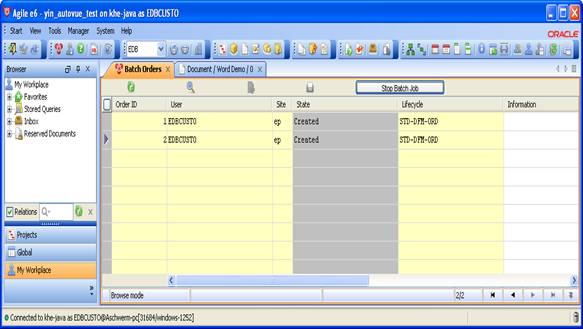
The order positions are assigned to the order and specify which files should be cached on the AutoVue server.
It is only necessary to add the base file of a 3D assembly. The batch job caches all related native files on the AutoVue server to pre-cache the assembly.
The state shows the current working state of the order position.
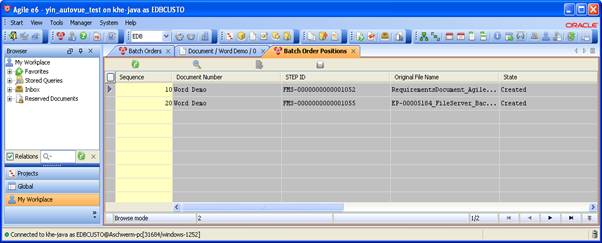
The system provides two userexits to add documents and files to the Offline Metafile Cache:
xpvm_bat_doc
Creates a new order and adds all assigned files which are viewable with AutoVue to an order position.
This userexit is used for document masks.
xpvm_bat_fil
Creates a new order and adds the specified file to an order position.
This userexit is used for Document - File relation masks.
|
Note: Both userexits are select-menu userexits. |
It is also possible to create orders and elements via LogiView by creating records in the order and order position masks.
In the standard installation, the userexit xpvm_bat_doc is available on the document master form.
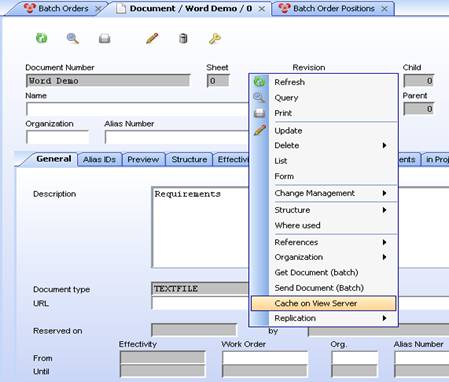
In the standard installation, the userexit xpvm_bat_fil is available on the document file sub list.
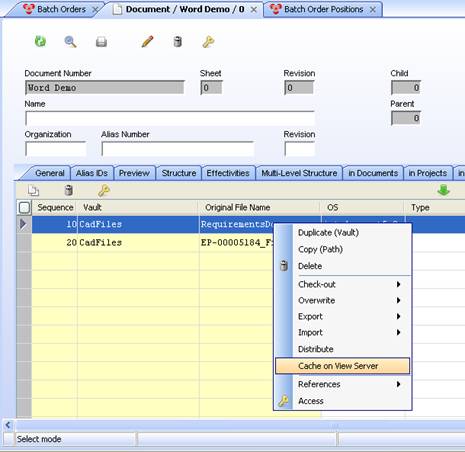
The Offline Metafile Cache feature uses the Batch Client to control the caching process.
The main loop is implemented on the Batch Client to reduce the load on the EDM server machine.
The sleep interval length can be configured in the Batch Client settings.
|
Note: The batch process is available on Windows and Oracle Linux only and should be installed on a machine near to the AutoVue server to reduce the network traffic.The batch process can be installed as a Windows Service or run as a console program. Further information about the Batch Client can be found in the Batch Client Guide for Agile e6. |